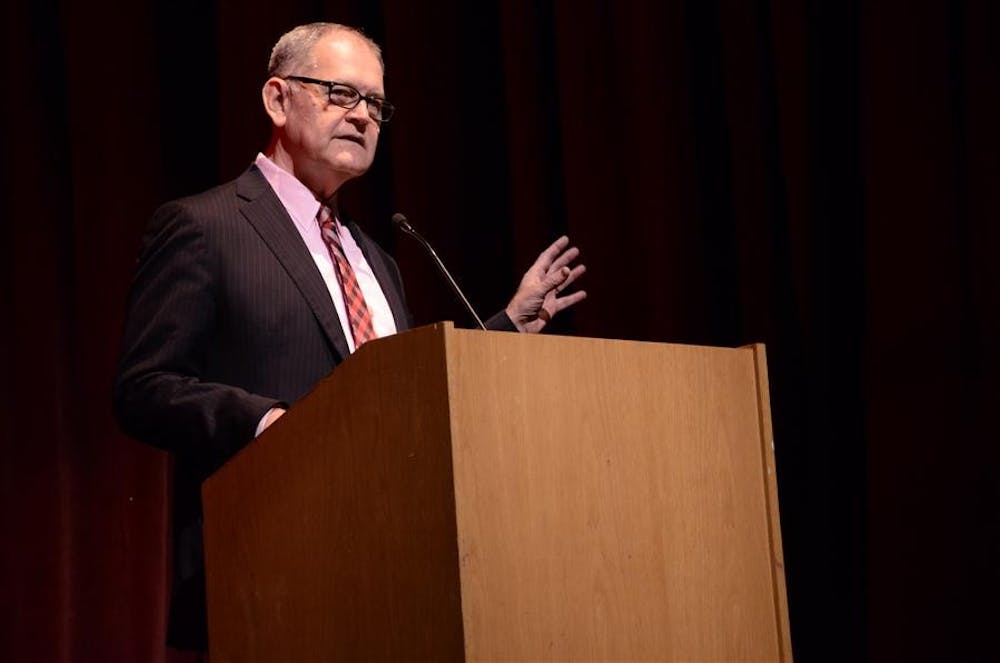Wearing a pinstripe suit and Ray-Ban glasses, author, whistle-blower and health care reform advocate Wendell Potter crossed his legs in a dressing room of the Buskirk-Chumley Theater on Sunday afternoon. Potter spoke to the Indiana Daily Student about his resignation from Connecticut General Life Insurance Company (CIGNA), his book and whether or not he has any regrets.
IDS You quit your position at CIGNA in 2008. What was an experience you mention in your book that ignited your resignation?
WENDELL POTTER I had to defend my company for denying a liver transplant to a 17-year-old girl in California. That was pretty emotional for her family, of course. Over the course of my time in the insurance industry, I had to defend a lot of high-profile cases and horror stories. This one was different though. This was a 17-year-old girl who was fighting for her life.
Doctors said she could live if she had a transplant, but CIGNA said no. A representative didn’t think it was appropriate for her, that it was experimental. They denied coverage. It was a fragile case, and the company eventually agreed to pay for it after the family brought public attention to the case.
Over the time CIGNA agreed to cover it, it was too late. Natalie died just a few hours after CIGNA agreed to pay for it. I can just imagine how devastated the family was. She had ambitions, just like any young person. She might have lived if she had had the transplant. We’ll never know, but I decided I couldn’t keep doing what I was doing. It was the last straw.
IDS What went through your head as you turned in your resignation?
POTTER What am I going to do next? It was a scary feeling, the second scariest feeling I’ve ever experienced. The first was addressing the Senate the next year, but at that time, all I could tell myself was that I was taking the step I needed to take.
IDS Michael Moore, in an interview with MSNBC, called you a hero. How do you feel about that?
POTTER I feel flattered, honored and surprised he even knew my name. I gave a sincere apology to Moore and the “Sicko” creators. That was good journalism. They depicted the health care industry well.
IDS Your book was reviewed as a “wake-up call.”
POTTER It had remarkable reviews, and I was pleased to see that. That is how I had hoped people would receive it. Most people are either not paying attention or not caring what is really happening to our health care system and even more broadly to our democracy. This is not a book just about the failings of our health insurance industry and how PR people keep it going and deceive Americans, but it’s a book about how corporate interests are in control of our country. I’m worried that our democracy has already been replaced with our country being controlled by corporate executives.
IDS What would you like to see from the younger generation?
POTTER Young people, in general, are tuned out. Our health insurance industry, as it is now, inhibits economic growth in this country. People want jobs in big corporations because that’s where they can be best insured of health coverage. Many people are locked in those jobs. A lot of young people who would like to start their own companies or small businesses are afraid to do it. People at any age are afraid to do it.
I think if we had a better health care system, we would have a lot more job opportunities, a lot more freedom of choice of jobs. We would have an economic bonanza that we’ve never had before.
IDS What did you want to be growing up?
POTTER In high school, I wanted to be an architect, but I realized quickly that I didn’t have the talent. I was encouraged to pursue writing by an English teacher, and I wanted to be a journalist. I was a journalist, and I got interested in PR where there was more jobs and things paid for. Working in PR can be a good way to earn a living. My advice to anyone interested is that what you learn in college often bears little resemblance to what it’s like in the workplace, especially big corporations. I was asked to do things and actually doing things that I could have never imagined myself doing. It’s important to keep your moral compass and not let yourself be persuaded to do something immoral.
IDS Do you regret doing any of the things that you did in your job?
POTTER If I hadn’t done what I did, I wouldn’t know what I know. I, then, wouldn’t be in the position to tell people what I know. So in that regards, no, I can’t regret. It doesn’t do any good to regret because I can’t change the past. I can make amends and put what I’ve learn to good use. That’s what I’m trying to do.
Q&A with author, health care reform advocate Wendell Potter

Get stories like this in your inbox
Subscribe





